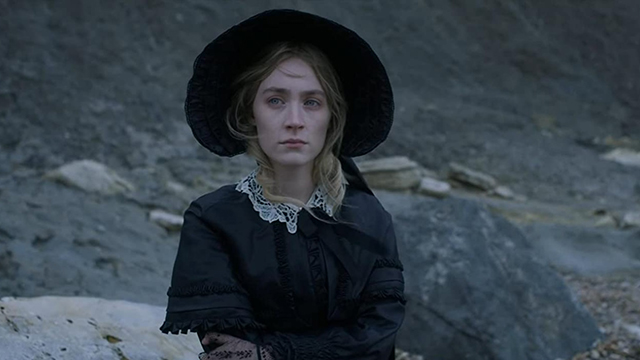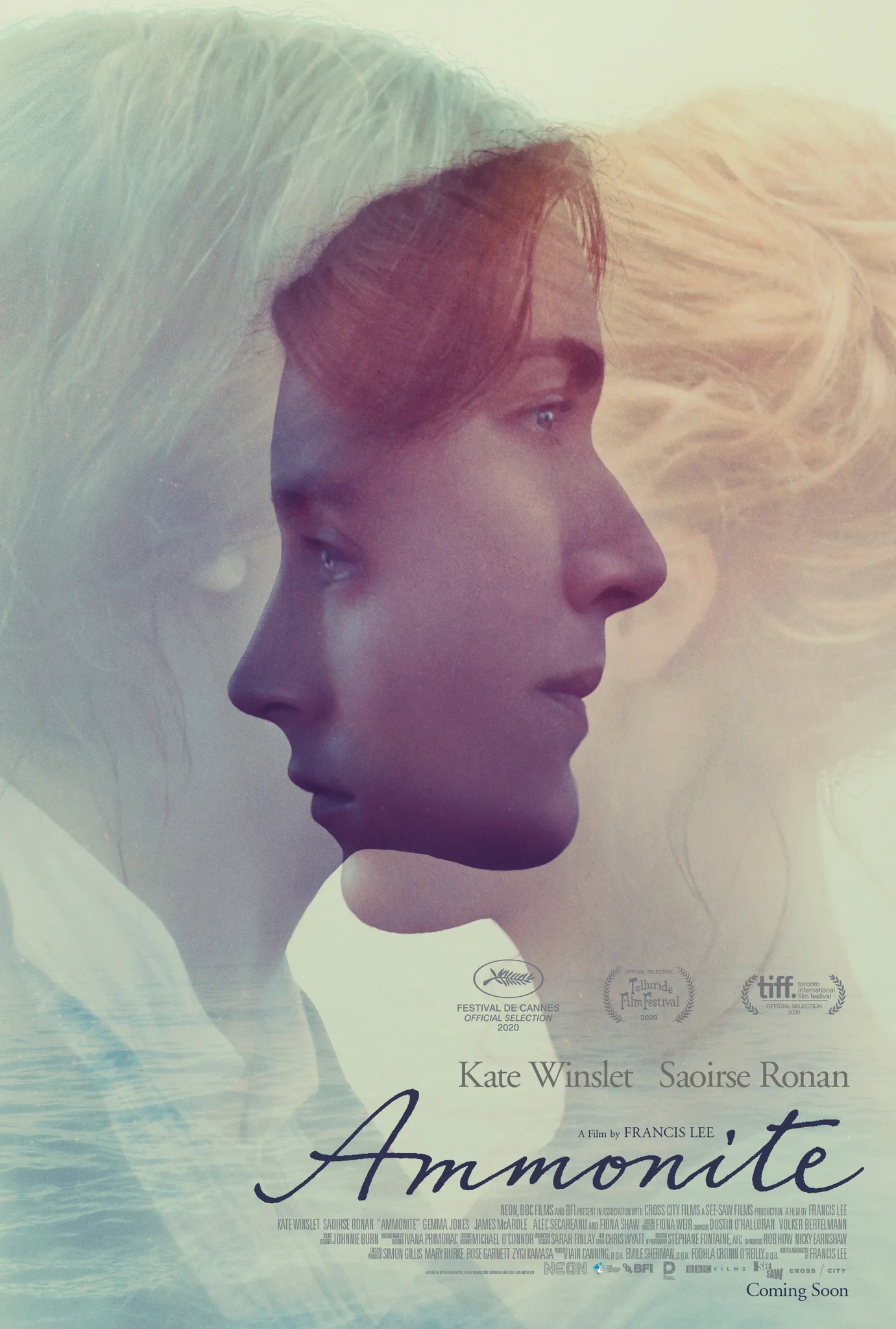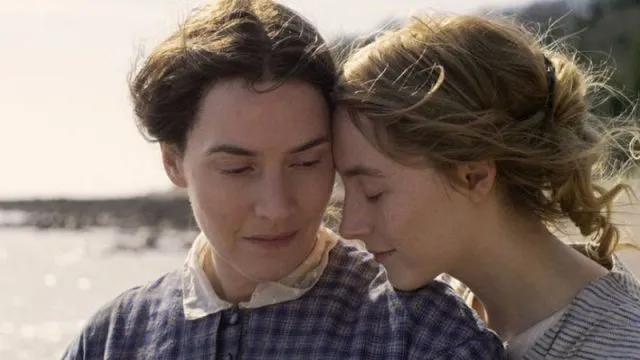Ammonite is now playing in theaters and, based on critical reactions, already looks like an Oscar contender. To celebrate the film’s release, we spoke with the great Saoirse Ronan, who dropped some interesting insights into the production, her chemistry with Kate Winslet and the challenges of working on the film.
RELATED: Blackbird Trailer Starring Susan Sarandon & Kate Winslet
Set in 1840s England, Ammonite follows the story of an acclaimed but unrecognised fossil hunter Mary Anning works alone on the rugged Southern coastline. With the days of her famed discoveries behind her, she now searches for common fossils to sell to tourists to support herself and her ailing mother. When a wealthy visitor entrusts Mary with the care of his wife Charlotte, she cannot afford to turn his offer down. Proud and relentlessly passionate about her work, Mary initially clashes with her unwelcome guest, but despite the distance between their social class and personalities, an intense bond begins to develop, compelling the two women to determine the true nature of their relationship.
The film is being produced by Iain Canning (Widows) and Emile Sherman (Lion) alongside Fodhla Cronin O’Reilly (Lady Macbeth). It is a production by See-Saw Films with Winslet, Simon Gillis, Mary Burke, Rose Garnett and Zygi Kamasa set as executive producers.
RELATED: The French Dispatch Trailer for Wes Anderson’s Latest!
Ronan is an Oscar nominee for her performances in Atonement, Brooklyn, and Lady Bird, for which she won the Golden Globe. She recently earned her fourth Oscar nomination at the young age of 25 for her performance as Jo March in Greta Gerwig’s Little Women. Both Winslet and Ronan are part of the star-studded ensemble cast of Wes Anderson’s upcoming drama The French Dispatch.

ComingSoon.net: Congratulations on the film! I thought it was a really good movie. You delivered a great performance and your onscreen chemistry with Kate Winslet was fantastic.
Saoirse Ronan: Oh thank you.
CS: How did you craft that natural chemistry you two display on screen together?
Ronan: Well, I guess that’s it. It’s kind of a natural thing and you’re either looking to find it with the person you’re working with or not really. And I mean, we both knew going into it that we got on with one another because we had met randomly over the course of a few years, just through press junkets and roundtables. And we did a photoshoot together, an actor photoshoot thing. And so, yeah, and we have a few friends in common and things like that. And [Peter] Jackson obviously loves her from Heavenly Creatures, so I’d spent a lot of time hearing only lovely things about Kate [while filming The Lovely Bones]. And yeah, and we sort of, we knew that in terms of the way we work and our sort of wavelength we’re on, we’re very similar. And so, yeah, so we just kind of got on straight away. And I just constantly ripped the piss out of her, really, and she’s a really good sport. She lets me do it.
CS: How did you get involved with Ammonite?
Ronan: I mean, I think Kate might’ve put me forward for it. I think she definitely pushed me to Francis. He had no choice. So she was incredibly supportive in terms of me taking on the role of Charlotte. And yeah, and it was during the “Little Women” shoot that I received the script and read it on one of my days off. And I think because I was on something at the time that was so kind of action-packed in a way, there was a lot of energy, there were a lot of actors within one scene and a lot of talking, a lot of overlapping, there was just in general, bursts of energy on Little Women on the set. And I guess I was drawn towards something to follow that up with, which was quieter and a little bit more stretched back. Well, not stretched back, but scaled down. And the script came along, and Kate was already attached. And I had really loved God’s Own Country when it came out, when I saw it. And so, Francis was someone I was interested in working with. And you know, it was very conscious, as great as it is to do the slightly bigger indie films as well, to still do the smaller films that I’ve kind of grown up doing, because that’s, yeah, they’re the kind of sets I really love being on. So yeah, so I think that’s why I was drawn to it. And then, Francis and I had extensive conversations about it on the phone. And I spoke to Kate quite a few times about it. And yeah, and then we did it a few months later, and it was great. It was nice to essentially do like a two-hander with someone you know.
CS: There’s very little dialogue in the film. Did you find that aspect challenging or rewarding? And what kind of difficulties lie in that style of filmmaking?
Ronan: Yeah, I mean, it can be challenging. You know, as I said, especially when you’ve been doing some of that sort of really based on dialogue and text, and I mean, I love doing both. When I was younger, especially with things like Atonement and Hanna and a lot of stuff that I did when I was a child, I didn’t really speak that much. So for a long time, I think my safe space was characters that didn’t really speak that much. I think I now really love doing both, once the writing is great, because there’s nothing worse than, you know, bad dialogue that you’re being forced to say. But yeah, it was this incredibly quiet film. And it was fine that it was frustrating because I think that was the point — and I experienced this even with something like Brooklyn, when you’re doing something that’s set in a certain time period and you’re trying to convey an emotion and you can’t really express that through language, you do become quite restrained, and in the way you are and probably even in just the type of emotion that you get out of yourself.
And that’s the way Charlotte needed to be. She really needs to be in this very low, almost kind of normal state when we meet her. And then, she very, very gradually, very, very slowly starts to come out of that. So yeah, it was challenging because I’d come off of something that was so like, words, words, words, and you know, throw your arms around and move in whatever way I wanted. I had complete freedom in that way. And then, for the first time ever, really, was playing the woman in the period piece that had the pretty dresses on and the pretty — or weird, but pretty — hair and the corsets, and I was very restrained in the way I moved. And that was very new territory for me.
CS: How familiar were you with Mary Anning’s story before you began filming?
Ronan: I wasn’t familiar with her at all, but I do know a 10-year-old who was obsessed with fossils. And before I went off to make the film, I said, “Yeah, I’m going to do this film and it’s about a woman who was a paleontologist. She’s a fossil hunter.” He was like, “Is it Mary Anning?” So a 10-year-old friend of mine knew it before I did. But I mean, people have responded to this film in different ways. For some people, the fact that we’re following two women in it in a romantic relationship is incredibly important for them. For others, it’s something else. I mean, for me personally, the thing that I really love about the film is the honoring of the work that Mary Anning did.
She was really an incredible woman, and there were only a few of her around at that time. But nobody was making strides. No other woman was making strides, really, in the way that she was in that field. And she was completely overlooked for so long. And I think the more research that I did into her, the more I really appreciated and respected the manual labor that this woman did in order to then make something that was really precious and beautiful and polished and kind of delicate. And I really like that sort of contrast in this woman’s work, where she would literally climb up a cliff face and pull or dig a rock out of the cliff face, take it home and chisel away at it and polish it and turn it into something really beautiful. And so, for me, when I watch the movie and when we were making it and seeing the work that Kate was even doing to sort of convey that, I more than anything else walked away with so much respect for the work that this woman did.
CS: So how important and/or relevant is a film like Ammonite in today’s society?
Ronan: Oh I mean, it sounds important and relevant as any other film that’s out there, you know? I mean, there’s obviously a reason why we all responded to it, and audiences seemed to be responding to it pretty well. And I think it’s, you know, whether it’s a man or a woman, it’s always really fascinating to watch someone who was essentially a loner and sort of an outcast in society and see how they live their life, their private life. And when you bring another character into that, that would allow the audience to experience that through this other character. So Charlotte, in this case. That’s really fascinating. As I said, I mean, I think the thing for me certainly, as a young woman who works and who has grown up in a world of creativity and collaboration and working very intimately with other people, I really, really enjoy it, you know, coming together and watching a film that shines a light on that process, every intricate process. But you know, I think it’s just relevant in a sense that it’s a deeply sensitive film.
CS: You mentioned working with Francis Lee. What kind of freedoms did he give you on set? And were you surprised at all by his style? Or was it different from other directors you’ve worked with in the past?
Ronan: Yeah, I mean, I feel like every director is quite different in their own way. They always kind of introduce you to a slightly new way of doing things or working or viewing a story or just finding a new method to use that you can get into a character’s head. And I think for Francis, one of the things that he spends a lot of time on is the sort of lead-up to the film and the conversation that you have with him before the actual shoot begins. So we spent a lot of time in the months leading up to the shoot talking on the phone and you know, I went out and did piano lessons and did cross-stitch, which was very exciting. And yeah, and so, we had just a lot of conversations, really. And he encouraged me to keep a diary of Charlotte and just sort of immerse myself in this imagined life. Because this is a sort of imagined story, you know, based on these women, but yeah. We were sort of given a bit more artistic freedom in that sense. And yeah, and you know, he definitely had a very clear vision in terms of how he wanted the film to look, and the kind of energy he wanted us to bring to it was very, very specific. It did need to be quite contained. So I think definitely for me, that was a challenge. But knowing that, he was dead set on that meant that I had this kind of anchor, which was great.
Ammonite
-
Ammonite

-
Ammonite











